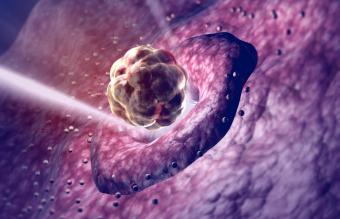
If you're pregnant and experiencing aching knees or a shooting pain in your hips, you're not alone. These symptoms are common complaints among moms-to-be, especially those in the third trimester. As with any pregnancy symptom, it's important to learn the facts and find out when to call your doctor. Additionally, there are a few steps you can take to reduce the pain and get back to your normal routine.
Types of Pregnancy Joint Pain
According to a study by the Mayo Clinic, more than half of pregnant women have some type of joint pain during pregnancy. Typically, this pain is in the hips or lower back, but it can occur anywhere in the body.
Hip Pain
If you're experiencing pain in your hip, it can make many of your daily tasks uncomfortable or even impossible. Even sleeping on your side, the recommended position for pregnant women, can be very painful. According to Parents Magazine, your hip pain may fall into one of two categories:
- Sciatica - This pain, which is actually caused by a nerve, can make your hips feel very tender. Typically, this is caused by the baby's position. If your little one is resting on the sciatic nerve, you may notice numbness and tingling, as well as pains that shoot from your hip down the back of your leg. The pain often goes away if your baby changes position.
- Generalized hip pain - This type of pain is also common, but it's a little harder to pinpoint a cause. Parents Magazine reports that most doctors believe general pregnancy-related joint laxity is to blame.
To alleviate your pain, you can try resting the joint, using heat or ice, and talking to your doctor about pregnancy-approved over-the-counter painkillers.
Sacroiliac Joint and Symphysis Pubis Dysfunction
Your sacroiliac joint, or SI joint, is located in your lower back, right by your tailbone. According to Spine-Health, sacroiliac joint dysfunction is the most common reason for pregnancy-related back discomfort. Symptoms of this type of joint dysfunction include a sharp pain on one or both sides of your tailbone that may get worse with standing or walking and a loud clicking noise when you roll over in bed or move from one position to another. This type of joint pain is caused by the pregnancy hormone relaxin, which tells your joints to relax and prepare for childbirth.
Similar to the sacroiliac joint in the back, your symphysis pubis is where your pelvic bones join in the front. When this joint doesn't line up quite right or has a small gap, What to Expect reports that it can cause a number of unpleasant symptoms similar to those of sacroiliac joint dysfunction. Rolling over, standing up from sitting, and walking can all cause pain. This condition is also due to relaxin, which loosens up your joints.
Some women find that a pregnancy support product like the Prenatal Cradle from It's You Babe can help with symptoms. Performing Kegel exercises and pelvic tilts can help to strengthen your muscles, and you can ask your doctor about working with a physical therapist to come up with an exercise plan to bring stability to your pelvic joints.
Knee Pain
As you gain weight during pregnancy, your knees are under additional strain. For some moms-to-be, this can result in significant knee pain, according to EverydayHealth. Knee pain during pregnancy can be caused or exacerbated by the additional weight you're carrying, as well as the pregnancy hormone relaxin, which can cause your kneecap to not track right.
This pain typically goes away after your baby is born, but there are a few things you can do in the meantime to help:
- Choose your shoes carefully. They should have plenty of cushioning and support.
- Try to stay off your feet. Limit the amount of time you spend standing in one position.
- Stay active. Exercise will build the muscles that help to support your knee joint.
- Talk to your doctor about physical therapy and the use of pain relievers during pregnancy.
Pain in Other Joints
Your hips, back, and knees aren't the only joints that can be affected by pregnancy. In fact, all of your joints are looser and under more strain during this period. You may experience pain in your hands, wrists, elbows, neck, and other joints. If you have concerns or your pain is severe, you should always talk to your doctor or midwife about your condition.
When to Be Concerned
Some level of joint pain is common during pregnancy, but you should discuss any type of pain with your health practitioner. If you're experiencing pain in your lower back, this could be a sign of impending labor, especially if it is accompanied by pain in the abdomen. If you pain is occurring at regular intervals and you are not yet 37 weeks pregnant, call your doctor immediately to rule out pre-term labor.
Talk to Your Doctor and Take It Easy
In almost all cases, your joint pain will improve or even go away after your baby is born. In the meantime, talk to your doctor and take it easy. You'll be feeling better soon.







